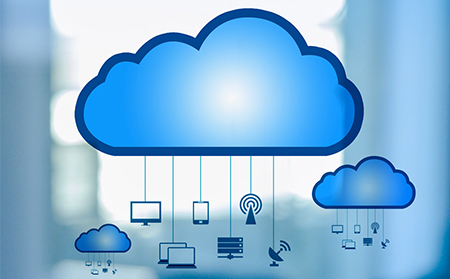Cloud Based Solutions
In recent times, IT industry has witnessed a massive shift in the delivery of computing power from centralized mainframes (cloud servers) to the desktop.
IT industry is now on the cusp of a complete transition from desktop computers to small yet powerful mobile computing, and hybrid computing models such as peer-to-peer, grid, virtualization, and cloud, etc.
Due to the advancements in technologies like storage, memory and computing power, vendors often try to consolidate and differentiate their cloud computing services under new banners, often mixing old and new offerings to present an entirely new concept. The best example of such offerings are Yahoo, Amazon, Gmail, Facebook and the list goes on.
Today, cloud computing applies to the many different types of services offered via the internet. In many cases, the devices used to access these cloud services do not require any additional applications to access those services.

At present organizations are using three delivery models to offer their cloud services.
Software as a Service (SaaS): In this type of cloud delivery, vendors host their applications in the cloud, and the customers are allowed to access that application over the internet. In SaaS model, customers do not have control the OS, hardware or network infrastructure.
Platform as a Service (PaaS): In this type of cloud service delivery, vendors allow the customers to host their own applications in the cloud. In PaaS model, customers have total control over the applications that run in the environment but do not have control over the OS, hardware or network infrastructure on which they are running. The PaaS model is typically an application framework.
Infrastructure as a Service (IaaS): In this type of cloud service delivery, customers have total control over their OS, storage, deployed applications, processing power, networking components, but do not have any control over the cloud infrastructure beneath them.
While there are numerous benefits of using cloud computing from economies of scale to the acceleration of speed to market, there are also some risks or challenges associated with it. Some of those challenges are the integration of IT and network resources, testing and deploying applications, (Service Level Agreement) SLAs, data protection, privacy, security in clouds, etc. This is where NuMSP comes into play. NuMSP is a complete integrated IT Management Platform designed especially for MSPs.
As part of NuMSP, essential services such as Remote Monitoring and Management, Service Desk, and Patch Management are offered free of charge in one single console.
NuMSP can help MSPs reduce operational expenses and improve the quality of service. Other benefits of using NuMSP is that it will take up end-to-end accountability and ownership which lowers the risk for MSPs.
